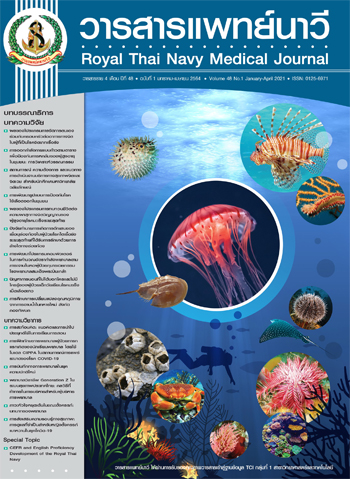Generation Z Registered Nurses of the Health System in Thailand: Challenging Management Strategies for Nursing Administrators
Main Article Content
Abstract
Generation Z registered nurses are the new generation of nurses in the 21st century who have recently begun their work in the health system. They will play an important role in the health system in the future by keeping people to stay healthy. There are some dominant attributes and limitations which nurse administrators must learn, understand, and accept, as well as enhance their potentials in order to work effectively. This article aims to present the dominating characteristics of thought, attitude, behavior, motivation, demand, and expectation. It also suggests strategies and guidelines for the generation Z registered nurse administration which consist of 5As including: 1) access: fast, multi-channel, and easily accessible communication; 2) ability: promoting diverse abilities; 3) autonomy: freedom of working with mentors’ supervision; 4) acceptance: accepting and understanding differences; and 5) advancement: promoting work endurance and progress. These will be beneficial to effectively administrate the nurses in this generation. Different generations of nurses can happily work together and move forward to achieve their ultimate goals.
Article Details

This work is licensed under a Creative Commons Attribution-NonCommercial-NoDerivatives 4.0 International License.
References
2. Pookbunmee R. The nurse’s roles Thailand 4.0. [Internet]. [cited 2019 October 18]. Available from: https://med.mahidol.ac.th/ramachannel/home/article. (in Thai).
3. Siriphim C. Generation Y professional nurses: a challenge for nursing administrators. Nursing Journal of the Ministry of Public Health 2018;28(1):1-12. (in Thai).
4. Srisuphan W, Sawaengdee K. Recommended policy-based solutions to shortage of registered nurses in Thailand. Thai Journal of Nursing Council 2012;27(1):5-12. (in Thai).
5. Sawaengdee K. Crisis of nursing shortage in health service facilities under Office of Permanent Secretary, Ministry of Public Health: policy recommendations. J Health Sci 2017;26(2):456-68. (in Thai).
6. Bencsik A, Horváth-Csikós G, Juhász T. Y and Z generations at workplaces. Journal of Competitiveness 2016;8(3):39-42.
7. Bell JA. Five generations in the nursing workforce: implications for nursing professional development. Journal for Nurses in Professional Development 2013;29(4):205-10.
8. Sladek S, Grabinger A. Gen Z: the first generation of the 21st century has arrived. [Internet]. [cited 2019 October 18]. Available from: https://www.xyzuniversity.com/wp-content/uploads/2018/08/GenZ_Final-dl1.pdf.
9. Berkup SB. Working with generations X and Y in generation Z period: management of different generations in business life. Mediterranean Journal of Social Sciences 2014;5(19):218-32.
10. Salleh MSM, Mahbob NN, Baharudin NS. Overview of generation z behavioral characteristic and its effect towards hostel facility. International Journal of Real Estate Studies 2017;11(2):59-67.
11. Chicca J, Shellenbarger T. Generation Z: approaches and teaching-learning practices for nursing professional development practitioners. Journal for nurses in professional development 2018;34(5):250-6.
12. Chulerd P, Sookeadee B, Kulpanich M. The humanize health care development in generation Z nursing students. Journal of Nursing. Public Health, and Education 2017;18(2):28-35. (in Thai).
13. Wongcharee C. Teaching to critical thinking in generation Z nursing student: a review of literature. Journal of The Royal Thai Army Nurses 2019;20(1):21-30. (in Thai).
14. Saenung S. Managing generation z nurses in nursing team: experiences of head nurses at an autonomous university hospital. [Master’s Thesis, Faculty of Nursing]. Chulalongkorn University; 2018. (in Thai).
15. Chicca J, Shellenbarger T. Connecting with generation Z: approaches in nursing education. Teaching and Learning in Nursing 2018;13(3):180-4.
16. Chicca J, Shellenbarger T. A new generation of nurses is here: strategies for working with generation Z. Am Nurse Today 2019;14(2):48-50.
17. Hampton D, Welsh D. Work values of generation Z nurses. JONA: The Journal of Nursing Administration 2019;49(10):480-6.
18. Parinya R, Teeranut H. Role change experience: from nursing students to registered nurses. Thai Journal of Nursing Council 2012;27(2):51-62. (in Thai).
19. Ozkan M, Solmaz B. The changing face of the employees–generation Z and their perceptions of work (a study applied to university students). Procedia Economics and Finance 2015;26:476-83.
20. Finn CP. Autonomy: an important component for nurses’ job satisfaction. International Journal of Nursing Studies 2001;38(3):349-57.
21. Westra BL, Clancy TR, Sensmeier J, Warren JJ, Weaver C, Delaney CW. Nursing knowledge: big data science-implications for nurse leaders. Nursing Administration Quarterly 2015;39(4):304-10.
22. Proctor B. Training for the supervision alliance: attitude, skills and intention. In: John R, Cutcliffe JR, Hyrkas K, Fowler J. Routledge handbook of clinical supervision. New York: Routledge; 2010. p. 51-62.


